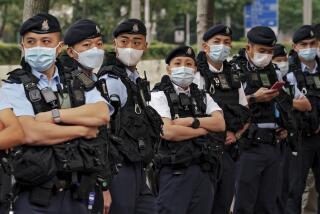As Hong Kong marks 18 years since handover, many not proud to be ‘Chinese’
- Share via
Reporting from Hong Kong — Each July 1 for the last 18 years, citizens in this former British colony have marked the territory’s return to Chinese sovereignty with a protest march that coincides with official commemorations of the anniversary.
This year’s rally was the first since last fall’s massive pro-democracy protests, and came just two weeks after activists blocked a Beijing-drafted package of election rules that would have limited voter choice in the city’s 2017 elections.
Turnout though, was down from previous years, and there was no urgent, unified rallying cry in Wednesday’s march. Even so, in-your-face defiance directed toward Beijing was palpable.
Dozens of colonial Hong Kong flags were held aloft by leading marchers, along with signs that read “Stop China’s Colonization in Hong Kong” and “Separate from the Communist Party.”
Among those in attendance were college students who kick-started last year’s demonstrations, organic farmers fighting to keep land from developers, Roman Catholics, gay rights activists, environmentalists, and many other citizens silently marching, showing their discontent with their feet.
Estimating the turnout of these rallies has long been a contentious affair. Police put this year’s turnout at 20,000, but organizers said the crowd numbered nearly 50,000. In years past, it has drawn as many as 500,000.
Hong Kong returned to Chinese rule in 1997 under an arrangement known as “one country, two systems.” The semiautonomous territory of 7.3 million has been allowed to keep its own English-based legal system and a wide range of civil liberties for 50 years under a mini-constitution known as the Basic Law.
But many Hong Kongers chafe at what they see as increasing interference from Beijing. A poll commissioned by the government-owned but editorially independent TV station showed only 23.5% of respondents think the “high degree of autonomy” promised by Beijing is being realized.
Earlier in the day, officials celebrated the anniversary with a flag-raising ceremony, attended mostly by mainland Chinese tourists. Fleets of fishing boats in Aberdeen Harbor were festooned with China’s national flag. Civilian medals of honor –- a recognition that was initiated in 1998 -- were announced. Among the honorees were a former police chief known for handling demonstrations with a heavy hand.
Poll figures released by the University of Hong Kong on Tuesday showed that 56% of respondents aren’t proud of being Chinese nationals. Notably, 78% ages 18 to 29 –- the very group who came of age in post-British Hong Kong –- said they took no pride in their Chinese nationality.
“In-depth analyses show that the younger the respondent, the less proud one feels of becoming a Chinese national citizen, and also more negative about the central government’s policies on Hong Kong,” said Robert Chung, director of the university’s Public Opinion Program.
Marcus Yip, who was born the year before the handover and has attended four annual marches, said he is among the discontented.
“China cares only about putting up appearances and projecting power,” said the college freshman. “I can’t be proud of a country only for its economic development.”
Law is a special correspondent.
More to Read
Sign up for Essential California
The most important California stories and recommendations in your inbox every morning.
You may occasionally receive promotional content from the Los Angeles Times.













